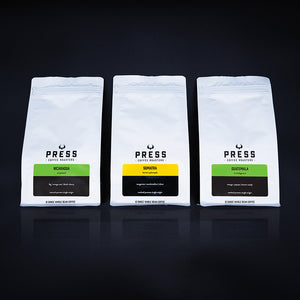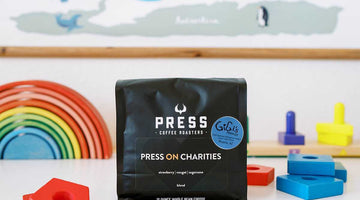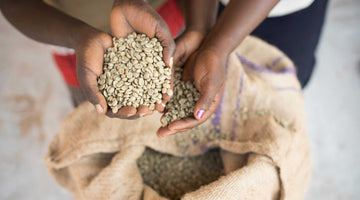Costa Rica Cordillera DeFuego Lot #27 - Limited Release
This anaerobic process Costa Rica comes from Tarrazú by producer Luis Eduardo Campos of Finca Cordillera De Fuego who is continuously pursuing innovative ways to improve his coffee production, developing new ways of coffee processing, and making the best farming practices to keep the high-quality standards, as this Costa Rica from lot 27 speaks for itself. Right when a little heat is applied to green beans in the roaster, coffee releases the strong sweet cinnamon stick aroma right away which stays until the end of the roast and shows up even stronger in the brewed cup. While cinnamon stays throughout the cup, this anaerobic process coffee also expresses notes of sweet sparkly ginger with notes of crispy and juicy Asian pear and the complexity of green grape and melon acidity. In 2017 Luis Campos joined NAMA (Nationally Appropriate Mitigation Actions) whose objective is to dramatically reduce emissions of greenhouse gases within the coffee sector. We contracted only 270 pounds of Lot 27 from our new friends from Village Coffee Imports, we actually were able to ship this pallet together with a different Arizona roaster, Kimhak Em from PairCup splitting the shipping cost.
The anaerobic process starts with the selection of handpicked and mature cherries that have a measured sugar content of near 26 Brix degrees. After the coffee is de-pulped and put in stainless steel with all its mucilage, which, in the absence of CO2, purposely creates an anaerobic fermentation process, coffee develops a unique series of lactic and malic acids which will translate to very complex flavors when brewed. Once it's ready, the coffee is 100% sun-dried.
Ethiopia Agaro Gera Tuma Tesso
Although Tuma Tesso only opened for its first harvest in the Fall of 2019, the farming cooperative is already making a name for itself with some of the best examples of the vibrancy a washed-process Ethiopian coffee can offer. The bright kiwi acidity featured in this crop stands nicely in a crisp, clean body alongside notes of white peach, honeydew, and the lingering sweetness of a candied pear.
We receive the Ethiopian Agaro from the Yukro, Duromina, and Nano Challa cooperatives in Ethiopia. Their coffees were flowing into the marketplace undifferentiated and undervalued. Once washing stations were developed, the unique character of their coffees developed and their production has grown stronger to this day.
The cooperative unions work on commission, with 90% of the price goes directly to the cooperative itself. The cooperative is made of local coffee farmers and the union maximizes the benefit the farmers receive from their work.
Guatemala La Inteligencia Washed
A cup of washed process La Inteligencia tastes almost like a candy flavors of a clean stone fruit mixed with a hazelnut chocolate bar body and notes of mango, all while carrying lemon candy sweetness throughout the cup.
Without the use of herbicides, this coffee is grown in the Hoja Blanca Cuilco region in Guatemala on the 34 hectare La Inteligencia farm. With over 25 years of experience, Señor Vásquez and his wife carefully select only the most mature cherries to pick for this roast. The green coffee analysis showed the high moisture and density content of the bean, elevating the washed process cleanliness in the cup, but with a great kick of roasted hazelnut and complexity of papaya.
Peru Cusco Fabiana Dueñas Llacta
We're excited to introduce the new washed Peru we bought from Red Fox Coffee Merchants, only 5 bags were available when we got samples, but right after reading the story and cupping the sample roast, we bought them right away. We highly recommend using Chemex as a brewing method for it, as it carries a unique acidity of red grapes and floral hints of prickly pear, that together results in a delicious rosewater body. When the cup cools down in the mug, the coffee expresses a rose perfume aroma and dark honey notes, keeping the grape texture through the cup with hints of red fruits such as raspberry. It is not meant to have rich sweetness, but a nice complex acidity of red fruits and hints of rosewater.
From Yanatile Valley in the Department of Cusco, South Peru, Valle Inca Coop functions as a producer group under the supervision of Predencio Vargas Saenz, who used to be an agricultural loan officer and running Valle Inca informally past few years, he eventually formalized the group this year and gained a Fair Trade certification and ability to export on his own, known for his honesty, trustworthiness, dedication, and drive to invest and reinvest in his community, genuinely engaging their goals and concerns, Predencio also buys parchment from farmers, reinvesting premiums in the community’s infrastructure to help them continue to enhance quality. He pays higher prices than farmers had access to before the founding of Valle Inca, which has helped to improve quality as well as overall community health over time. Leaders like Prudencio are rare, and the quality of the connection between leadership and producer shines through in the cup. At their best, coffees from Valle Inca display elegant honeyed florals, crisp red apple, and a pleasant tannic quality like oolong tea.
Fabiana Dueñas, one of 101 farmers of Coop, is a young and passionate coffee producer born in the coffee-producing district of Hynapata in 1990, with only 5 hectares dedicated to coffee production where she grows Typica and Pache varieties among with shade trees like Albizia and Pacay, she wishes to obtain national and international recognition in the future and her coffee speaks for itself.
Nicaragua Finca El Pastoral
This natural process Nicaragua is a stunning example of the skill and commitment Juan de Dios has invested in the family business. This cup is full of dried figs, caramel, and black cherry body throughout with a hint of orange zest bitterness and red apple complexity.
The certified organic Nicaragua Finca El Pastoral is cultivated on a family-owned farm, located in the municipality of Jinotega within the department of Jinotega, Nicaragua. The crop is grown in volcanic loam, composed mostly of silt and a smaller amount of clay. The temperate 70-80°F year, combined with moderate monthly rainfall in the region helps the fruit reach its full potential.
The fruit in the Finca El Pastoral is picked in the winter months, followed by a full natural process, drying out in the sun on guardiolas. The full natural process concentrates the flavor of the fruit into the bean, producing with a very expressive cup.
Sumatra Kerinci Palompek
While the entire cup is pervaded by a creamy marshmallow sweetness, this rare Washed Sumatra offers a bright tangerine acidity up front, dissipating into a rich, chocolatey clove on the back end, giving us one of the cleanest and most well balanced offerings from the region yet.
The Sumatra Kerinchi Palompek is grown on the Koetintji Barokah Cooperative farm in the West Sumatra and Jambi provinces of Indonesia. This particular washed lot comes from a longstanding relationship with the Barokah Cooperative, which has 140 members who cultivate on small family owned plots of land located around Mount Kerinci, the highest volcano in Indonesia.
The cooperative works closely with producers to decrease forest encroachment. Their farm management practices create a protective buffer for the Kerinci Seblat national park, which encircles the entire Kerinci valley with unparalleled natural beauty and habitat for the Sumatran Tiger.





